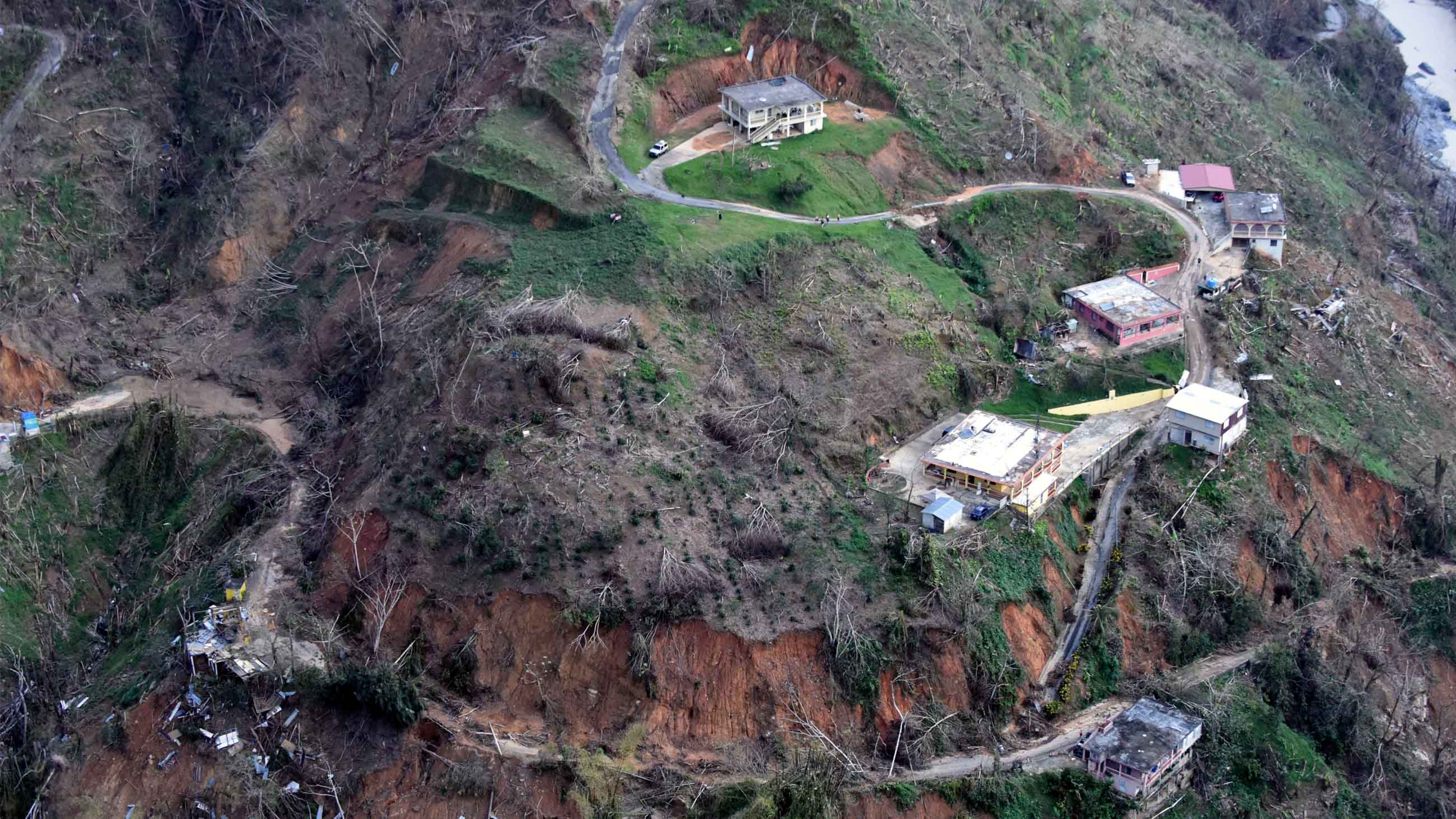It’s Time to Rethink the Relationship Between Borders and Climate Change
After 300 years of continuous human settlement, Hurricane Irma destroyed everything on the island of Barbuda and forced the relocation of its more than 1,600 residents, demonstrating that climate-induced migration is no longer a future possibility, but a present-day reality. A week and a half later, Hurricane Maria knocked out power for Puerto Rico’s 3.4 million residents and left much of the island without potable water. Fifteen percent of Puerto Rico’s population is expected to leave the island in the coming year.

Estimates vary, but the consensus is that there will be at least 200 million people displaced by climate change by 2050. In order to address this already unfolding reality, we need to reconsider the relationship between borders and climate change now.
It might seem that borders have no impact on climate change: Hurricanes destroy human settlements in the Philippines and the United States alike. Winds blow dust, pollution, and rains across borders. Sea level rise affects the countries that produced pollution and those that did not. But in reality, environmental change is shaped by borders and sovereignty in several significant ways.
First, there is a strong geographic pattern to where environmental pollution was historically produced and where environmental changes will most severely be felt today. Beginning with the industrial revolution, countries in Europe and North America produced 68 percent of all emissions, while only accounting for about one-sixth of the world’s population. Nevertheless, the latest Intergovernmental Panel on Climate Change report finds that the countries that have historically polluted the environment will be less negatively affected by climate change. The report identifies Sub-Saharan Africa and small island states, like Antigua and Barbuda, as the most vulnerable to climate change because they do not have the resources or infrastructure to adequately adapt to environmental changes.
Second, bounded sovereignty also makes it difficult to create effective international agreements to combat climate change. The sovereign rights of the state are revered by nationalist leaders because they endow them the ability to put the needs of their people above all others. In his United Nations speech on September 19th, U.S. President Donald Trump mentioned some variation of the word sovereignty 21 times. Although some criticize the U.N. as a form of global government, the charter of the United Nations enshrines the right to absolute sovereignty within borders and U.N.-sanctioned agreements — including the Paris Agreement — do not infringe on these rights.
In the Paris Agreement, states determine their own contribution, monitor their own progress, and face no consequences if they do not meet the goals they set. As long as local economic factors trump global environmental impacts, climate agreements are bound to fail.
Finally, and perversely, the countries that produced the majority of the emissions that cause climate change are now building walls and securing borders to prevent the movement of people who are displaced by it. As late as the year 2000, there were 15 border walls around the world, but today there are almost 70. Borders and sovereignty mean that countries can decide who has the right to move and can turn away even the most desperate people displaced by climate change.
There have been some early efforts to address the problem of climate induced migration. The Paris Agreement established funds for least developed countries and for adaptation, but these are focused on mitigating risks and rebuilding after disasters. Additionally, Germany and Bangladesh have been leading the Platform on Disaster Displacement, which is an intergovernmental effort to prepare for disasters through prevention and awareness. These meager efforts are well intentioned but do not go nearly far enough.
International institutions are meant to address issues that are not confined to single states but cross political borders. There is already agreement that a few very narrow issues including genocide and state-sponsored terrorism are exempted from the protection of state sovereignty.
The environment and the displacement of people from environmental changes are cross border issues that extend beyond the authority of a single country. In order to realistically address the climate crisis, two more exceptions to absolute state sovereignty are required: the right of people to move from one territory to another and the right of the global community, not individual countries, to regulate the emissions of climate changing pollutants. This does not mean getting rid of sovereignty entirely, but it does mean countries must give up sovereignty over decisions that involve issues that have significant cross-border impacts.
Opening borders and removing sovereignty from environmental decisions will be seen as radical proposals by some. However, the more radical choice is to build walls and ignore climate change, pushing us headlong into a rapidly arriving dystopian future of walled states, violent borders, and hundreds of millions of displaced environmental migrants struggling to survive rising seas, heat waves, and devastating environmental change.
Reece Jones is a professor of geography at the University of Hawai’i and the author of “Violent Borders.”
This piece emerged from a public discussion at Miami University of Ohio with Adrian Parr, a professor of environmental politics at the University of Cincinnati.











Comments are automatically closed one year after article publication. Archived comments are below.
Tim Metz, your comment is inane and getting laughably out-dated. Do you really think thinking people are unaware of their c02 exhalations? More importantly, do you understand that the emissions of our industrial society dwarf the collective breathing of the 7+ billion people? Drop the reactionary anti-government fear-mongering and start imagining a better solution than he admittedly horrible carbon taxes et. al. You have NOTHING to gain by being an unwitting pawn in the destruction of our ecosystem for other people’s profits (im assuming you aren’t a billionaire posting here).
Yeah, great idea Thomas Belfield. Hey, every time you take a breath, what is it you exhale? CO2! You’re a polluter! Guess we should arrest and prosecute you for “crimes against the environment.” In the meantime, we’ll just sell you on bs, build the narrative, then tax the hell out of you in the form of a “carbon” tax. Happy Veteran’s Day.
Hmmmm a common trope the ‘we all breathe CO2; you’re a polluter!’ argument. The key point against this argument is that it is about acceleration and volume of CO2 production in any biological entity. More to the point the actual level of XO2 produced by a single human is minimal and is not adding to that which already exists as it is consumed through ingesting animal meat (already produced) or exhaled through the same amount that was inhaled by plants amounting to about 3bn tonnes per year.
What is added to the atmosphere is that which is kinetically and temporally released through the burning external to the human body of fossil fuels which are endemic to the production of daily society through vehicles, residential and commercial heating (one of the biggest polluters), construction, air travel, etc. This is added to that which is naturally produced and reproduced. This is where the problem lies: a fossil fuel based economy.
I would like to argue that the ‘environment’ needs to be recognized as having international legal standing before the law. Just as there are crimes against humanity the international community must recognize crimes against the environment or crimes against the earth, if you will. That the current regime of the United States does not recognize the facts of global climate change would be a worthy case in an international court of the environment in which individuals who hold this view are arrested and prosecuted.
I love this idea. We now have animal rights. How much longer will it take to have rights for other natural entities?